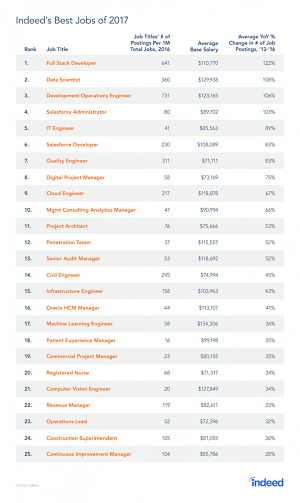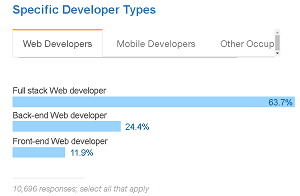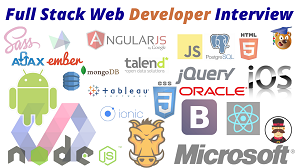Full Stack Developer Beats Data Scientist in Best Jobs Report
If you've been upskilling, retraining and chasing the dream of becoming a highly paid, extremely sought after and well respected data scientist, you might want to rethink that.
Indeed.com, a jobs site with its own active and prolific data science team, published a new report that names full stack developer as the best job in the U.S., surpassing their own profession as the usual No. 1 in such studies.
The position of data scientist has been named the top job in so many reports -- such as this one a couple months ago and this one from 2016 -- that GoodCall published an article investigating "Why Data Scientist Keeps Ranking at the Top of Every Best Jobs List." The profession was also famously deemed "The Sexiest Job of the 21st Century" by Harvard Business Review.
In the brand-new Indeed report, though, it comes in at No. 2. Weighing factors beyond salary, Indeed places full stack developer at No. 1. The position of data scientist actually fared well in the salary department ($129,938), being topped only by machine learning engineer.
However, the full stack developer position had more job postings per 1 million total jobs in 2016 (641) than data scientist (360) and a higher year-over-year change in the number of postings from 2013 to 2016 (122 percent vs. 108 percent).
 [Click on image for larger view.]
Indeed's Best Jobs of 2017 (source: Indeed)
[Click on image for larger view.]
Indeed's Best Jobs of 2017 (source: Indeed)
"All but a few are roles in computer science; seven of the top 10 jobs are software engineers and developers, with positions in management, healthcare and engineering rounding out the top 25 list," Indeed said in a blog post this week. "Some of the highest paying positions ranked in the top ten include full stack developers (#1), data scientists (#2), development operations engineers (#3), Salesforce developers (#6) and cloud engineers (#9)."
While there's no "official" definition of what the term full stack developer means, it's commonly associated with Web development. In its own definition, SitePoint said: "The term full-stack means developers who are comfortable working with both back-end and front-end technologies. To be more specific, it means that the developer can work with databases, PHP, HTML, CSS, JavaScript and everything in between, also, venturing as far as converting Photoshop designs to front-end code."
However, in its own survey last year, the Node.js Foundation ascribed a new meaning to the term, making room for the Internet of Things.
"The full stack is no longer 'front end and back end,' but rather 'front end, back end and connected devices,' which is a combination of everything from the browser to a toaster all being run in JavaScript and enabled by Node.js," the Foundation said. "The survey revealed that 62 percent of respondents are using Node.js for both front end and back end development, and nearly 10 percent are using Node.js for front end, back end, and IoT development."
The good readers of Hacker News also have a health discussion about what the term means in a 2012 post.
The No. 1 comment there reads:
To me, a Full Stack developer takes responsibility for the full stack. When a problem arises, she doesn't say:
- It's a database problem. Call the dbas.
- It's a network problem. Call the network folks.
- It's an app server problem. Call the ops team.
- It's a user interface problem. Call the UI team.
A Full Stack developer first says, 'This is my problem until I can locate the problem and possibly identify someone more skilled than I at fixing it'.
Some folks, however, don't buy into the term at all. Andy Shora wrote a post in 2014 explaining this viewpoint, titled "The Myth of the Full-Stack Developer." Scott Hadfield wrote his own post along the same lines, titled "The Full Stack Developer is a Myth." In the article, he said: "Well, that's not completely true, but you'll never find one. 'True' full stack developers exist, but so do geniuses and people who have been coding since they were 12."
 [Click on image for larger view.]
How Stack Overflow Web Developers Identify Themselves (source: Stack Overflow)
[Click on image for larger view.]
How Stack Overflow Web Developers Identify Themselves (source: Stack Overflow)
Myth or not, there seem to be a lot of them around. In the huge new developer survey just published this week by Stack Overflow, most respondents who identified themselves as Web developers said they were full stack developers (63.7 percent), compared to back end developers (24.4 percent) and front end developers (11.9 percent).
And in last year's "Great Mac Developer Survey 2016," the position of "Web Full-Stack" was the No. 1 term respondents identified with, beating mobile, front- and back-end specialists and many others.
 [Click on image for larger view.]
Brush Up on These Skills to Get a Job (source: Tekkkies)
[Click on image for larger view.]
Brush Up on These Skills to Get a Job (source: Tekkkies)
So, if you want to switch gears and join their ranks, you can find advice in the Relink Labs article "5 Tips From a Full Stack Developer." If you get to an interview, be sure to consult "How to Clear Full Stack Web Developer Interview" on the Tekkkies site.
Then again, a Signal v. Noise article advises "Just Starting Out? Ditch the 'Full Stack Developer' Label. It said: "Labeling yourself as 'full stack' might be doing you more harm than good, especially if you're just starting out."
Hmm, what's a money-hungry developer to do these days, then? Comment here or drop me a line.
Posted by David Ramel on March 24, 2017